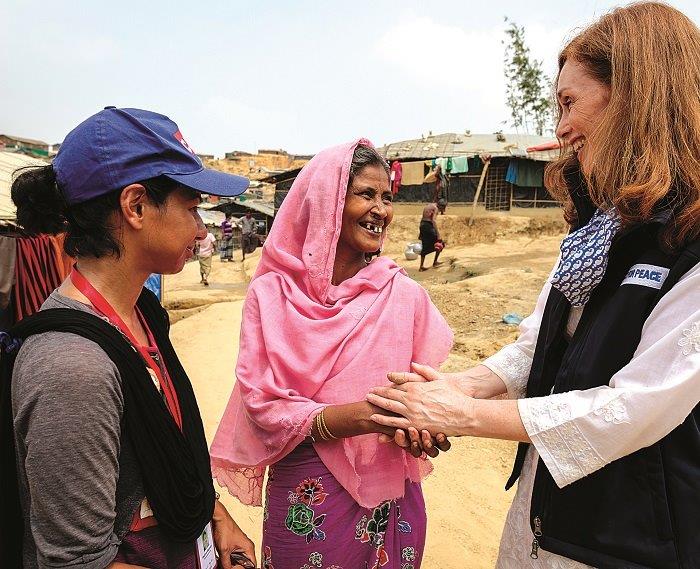“The love of Christ can be made more vivid through Australian Christian concern, on Christmas day, the one great day of sharing.” Rev Frank Byatt, founder of the Christmas Bowl c. 1956
As Christians, we are called respond to, and faithfully live out, the Gospel call to be generous in our love, and to participate in God’s mission to bring healing, wholeness and hope to those facing hardship and injustice. It sounds like an overwhelming task, but in fact we can reach people in need with the humblest of actions.
In August 2017, the world watched on in horror as the humanitarian crisis caused by escalating violence in Myanmar’s Rakhine State forced more than 700 000 Rohingya people across the border into Bangladesh.
I travelled to the camps to meet with our partner Christian Aid, to see what people in Australia could do to support Rohingya families.
My experience in the camp was intense. I had the privilege of meeting with deeply troubled but highly resilient people who had arrived in a place that wasn’t their own, seeking safety, and working hard to establish life on a day-by-day basis.
It felt very challenging to my soul. I met extraordinary people who told me their story and how difficult life is in the camp. Like Ayesha, a young mother who escaped with her family at night when the Myanmar army attacked their village.
Ayesha and her family travelled for days with little food or water to reach Bangladesh and the Jamtoli refugee camp. Conditions were so bad, she lost her newborn baby.
Despite the trauma of what she’s experienced, Ayesha still faces each day with incredible dignity and resolve. She wants to raise her children with safety and opportunity. And she is working really hard to support them on a daily basis.
Life in the camp is incredibly hard. On top of that, some people don’t know what has happened to their family members, many are trying to recover from the terrible violence they saw inflicted upon people they love.
Being there, I felt around me a sense of grief and loss that I haven’t experienced before.
Personally I find it troubling and shocking that people in our time experience such violence and trauma. We have an extraordinary crisis on our doorstep and I continue to feel challenged about how we can reach out as Christ would in this situation.
Back in 1949, an Australian Rev named Frank Byatt felt a similar challenge. He saw the plight of refugees who had fled the horrors of World War II and believed he had a responsibility to share the joy of his Christmas with others in need. That’s why on Christmas Day in 1949, he put a Bowl of Remembrance on the dinner table and asked his family to place a generous gift in it to ‘share your good dinner with hungry children in other lands.’
The tradition of the Christmas Bowl is incredibly important. To me, the Christmas Bowl is about family and friends coming together, pausing to be grateful for what we have, and thoughtful about how we can share this with others.
This year as we come together with loved ones to celebrate Christmas, it’s a significant time to stop and think about others less fortunate than ourselves, and to think about what we can give as we come together and celebrate Christ.
Janet Cousens, Chief Executive Officer, Act for Peace
Sharing God’s love through the Christmas Bowl since 1949
In Matthew, Christ tells us to feed the hungry, heal the sick and welcome the stranger. That’s exactly what we are doing together as we celebrate Christmas Bowl, which is the Christmas appeal of Act for Peace, the international aid agency of the National Council of Churches in Australia
Last year, churches raised an incredible $2.3 million through the Christmas Bowl. Uniting Church members across the country generously contributed close to $1million to provide food, shelter, medicine and healthcare for our brothers and sisters in urgent need around the world.
You can help support the work of Act for Peace by giving to the Christmas Bowl. Visit actforpeace.org/Christmas-Bowl for more.
Top image: Janet Cousens, CEO of Act for Peace, meets with Rohingya refugee Jamila, in Jamtoli refugee camp in April.
